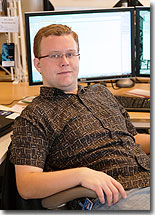Editor’s note:
On the eve of the Microsoft College Tour, PressPass asked for graduates from the schools that chief research and strategy officer Craig Mundie is visiting to talk about their experiences in college and at Microsoft.

Alex Lambert works at Microsoft’s Boston office in the New England Research and Development Center.
-
What did you study and why? At UIUC, I studied computer science. Initially, I was interested in computer security and networking. After a couple of years, though, I realized that the most challenging security problems weren’t technical – they involved people and processes. I changed my focus to social networking and human-computer interaction. For my thesis, I created an e-mail system that used social networking services like Facebook to prevent eavesdropping.
-
What are you doing at Microsoft now? I work at Microsoft’s Boston office at the New England Research and Development Center – yes, the NERD Center. I’ve been working with Future Social Experiences (FUSE) Labs. FUSE is a new lab; its mandate is to experiment with new social systems. Our latest project is Bing Twitter, a real-time search engine for Twitter. Bing is the first major search engine to index Twitter content. Bing organizes results based on social relevance so the most valuable Tweets appear first. My team was responsible for the entire front-end of Bing Twitter. I worked on the home page and on the topics cloud. I also handled product security.
-
What is a typical day like for you? I joined Microsoft just over three months ago. Bing Twitter was a secret project; I worked many late nights but couldn’t tell my friends why. Last Wednesday, we revealed the feature at the Web 2.0 Summit in San Francisco. Our senior VP announced Bing Twitter by demo-ing our work on stage. We spent the morning double-checking our capacity for the public launch and monitoring for spam on the home page. Our team watched the speech from Boston. As Yusuf took to the stage, I took out my laptop and watched the site’s load. I didn’t expect any problems, but this was my first time launching a high-traffic site. Immediately after the demo, Bing Twitter was released to the public; I spent a few more minutes watching our load and then headed to the team party. Over a beer, the team passed around my laptop and watched the site traffic take off.
-
What global problem do you hope will be solved by technology in the near future? The Internet has made it easier than ever to find and aggregate raw data like corporate financial disclosures, campaign contributions, and nutrition facts. But the maxim that “knowledge is power” is incomplete; raw data itself is not powerful. To solve global problems, we need more than just facts: data could tell us if businesses have been improperly using bailout money, if lobbyists have undue influence over our representatives, and if our food is unhealthy. But these conclusions require thoughtful analysis, and the conclusions are only meaningful if they translate into action and if that action creates change. The Internet’s cheap distribution systems have addressed the raw data problem, but we haven’t yet found effective ways to encourage people to act on these results. Social networking services could not only decrease the cost of organizing action but also help people convince one another of the importance of a cause. We haven’t yet seen the power of social networking tools in this arena, but I’m eager to see what they could provide.
-
Why is Microsoft a worthy employment objective for top grads? The fundamental challenge of computer science is transforming the infinite into the finite: to find a single solution for an infinitely large set of problems. This desire to making seemingly impossible problems tractable attracts people to computer science, and attracts computer science students to Microsoft. Microsoft has the resources to attack enormous problems. In school, I experimented with social networking by building toy Twitter applications on a salvaged computer. Just a few months later, my team is indexing Twitter’s public data in real time. Microsoft products also have a gigantic audience. Earlier I worked on Windows 7. Now, I’ve joined Bing, and my code is running on one of the most popular sites on the Internet. I’ve watched tweets about my product stream in from around the world; it’s gratifying to hear people talking about your feature.




